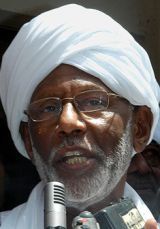Sudan’s Islamist leader Turabi blasts new constitution
KHARTOUM, July 7 (AFP) — Islamist leader Hassan al-Turabi has launched his fiercest attack to date against Sudan’s new interim constitution, due to be signed on Saturday under a north-south peace deal.
 Turabi, who was President Omar al-Beshir’s one-time mentor and only freed last week after 15 months in detention over an alleged coup plot, said it was drafted undemocratically.
Turabi, who was President Omar al-Beshir’s one-time mentor and only freed last week after 15 months in detention over an alleged coup plot, said it was drafted undemocratically.
The interim constitution was written by a committee “that was not representative of the Sudanese people,” Turabi told a crowd of some 5,000 people late Wednesday in his first public rally since being freed.
“Constitutions around the world are drafted by legislative organs rather than committees,” he said.
Turabi had celebrated his first day of freedom on June 30 by criticizing the new charter that sets quotas for political representation, when “this should be left to the people to determine”, and by attacking the government’s record on civil liberties.
But Sudanese officials and MPs hailed the charter, unanimously passed by parliament on Wednesday, as an important and historic document.
Even if the text had been drafted by the current legislature, said Turabi, it would still be undemocratic because its members “were either appointed or came through uncontested elections.”
The charter was drafted in line with a January peace deal Beshir clinched with southern rebels, opening the way for the establishment of a six-year interim national unity government with Sudan Peoples’ Liberation Movement leader (SPLM) John Garang.
The interim constitution was written by the National Constitutional Review Commission, a body dominated by Beshir’s ruling National Congress Party (NCP) and Garang’s SPLM.
Garang is to be sworn in as first vice president on Saturday. He replaces Ali Osman Taha, who will assume the post of second vice president in a government that will also include opposition figures.
Beshir will stay on as president.
Under the peace deal, the constitution stipulates that general elections will be held four years into the interim period starting Saturday and prospective contenders must first endorse the January Comprehensive Peace Agreement.
A new legislature is to be appointed shortly.
Until the polls take place, the NCP will have 52 percent of executive posts and legislative seats and the SPLM 28 percent.
Fourteen out of the remaining 20 percent will go to northern opposition parties, with the remaining six percent to be split among other southern groups.
Turabi, who has said he will not be part of the new government, also questioned the wisdom of having two vice presidents.
“I wonder what the job of the other one is going to be,” he quipped.
He also joked that the president may need the second vice president so that together they can crush Garang.
Turabi claimed that Beshir had fragmented the majority of the country’s political parties, “weakening and rendering them incapable of competing in general elections.”
Several southern militia commanders still have to sign on to the peace deal and will not be represented in the interim institutions.
Addressing parliament after it unanimously passed the constitution on Tuesday, Taha said “responsibility for safeguarding the constitution and translating it into reality on the ground lies with the people.”
The state, he added, will strive to exercise its politics in a good and responsible manner and be open to dialogue with all.
Another key point of the deal is self-determination for the south at the end of the six-year interim period.
The constitution says a law for undertaking the planned referendum should be issued in three years and that the vote should take place six months before the end of the transitional period, in January 2011.
